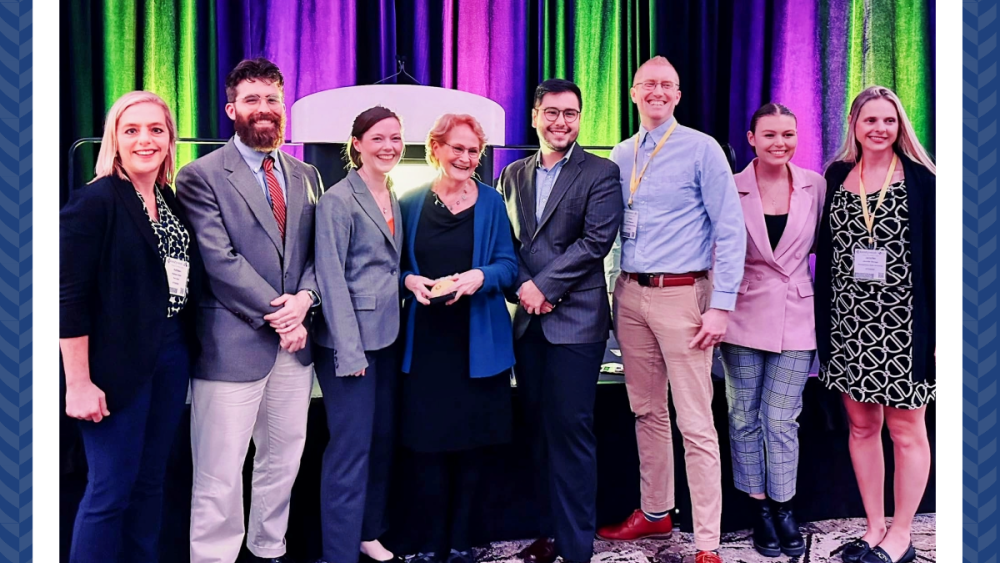
UNIVERSITY PARK, Pa. — Three Nutritional Sciences graduate students and a postdoctoral scholar recently presented at one of the nation’s premier conferences on obesity, ObesityWeek, as part of a keynote presentation by Barbara Rolls, professor and Helen A. Guthrie Chair of Nutritional Sciences. Rolls presented the keynote as the recent recipient of the Obesity Society’s Presidential Medal of Distinction award.
“Young investigators presenting during a keynote address at a conference of this magnitude is uncommon,” Rolls said. “I wanted to extend this opportunity as a way to introduce them to the field as up-and-coming experts, as well as showcase the research being done at Penn State.”
Rolls’ presentation “The Diet Wars: Can There Ever be a Winner?” considered the issue of how to support consumers in maintaining long-term healthy dietary habits informed by research-based recommendations. Each student participating in the keynote presentation shared their perspectives on how behavioral studies may address this concern related to the work they and their labs investigate.
Improving prevention and early intervention through longitudinal research
Nicole Skinner, graduate student in nutritional sciences, opened the student presentations by discussing the need for longitudinal studies to determine if obesity-based interventions in early childhood continue to be effective throughout a child’s life into adulthood.
“Early interventions in a child’s eating habits are important to help them develop healthy habits early,” Skinner said. “By following up longitudinally, we hope to see those healthy habits continue as they grow up.”
She noted she was thankful for this opportunity, as it is unique for graduate students to speak to a gathering of experts from all over the world.
“I am extremely thankful to Dr. Rolls for extending this opportunity to discuss the work that the Center for Childhood Obesity Research is doing and to be a part of this confidence-building experience,” Skinner said.
Skinner is advised by Jennifer Savage Williams, professor of nutritional sciences and director of the Center for Childhood Obesity Research.
Forging interdisciplinary alliances
Nick Neuwald, graduate student in nutritional sciences, explained how the obesity epidemic is a complex, multifaceted issue and appealed to experts to develop interdisciplinary collaborations when conducting research for solutions.
“We have many experts in the Children’s Eating Behavior Laboratory, but we can’t be experts in every area needed to find solutions,” Neuwald said. “One of our projects involves machine learning, and we need to collaborate with experts in this area in order to leverage these tools to answer important questions and streamline some of our work.”
He said Rolls has been an inspiration to him in his work and greatly appreciated the opportunity to address so many experts.
“Working with someone who is so famous in our field and them asking you to present to an audience of internationally known experts allows us to develop new connections and relationships with others that will be valuable for future research collaborations,” Neuwald said.
Neuwald is advised by Kathleen Keller, professor of nutritional sciences and director of the Children’s Eating Behavior Laboratory.
Leveraging common food properties to prevent overconsumption
Paige Cunningham, postdoctoral scholar in food science and nutritional sciences, discussed how different food properties — such as variety, portion size and energy density — can influence consumption, along with how those characteristics can be utilized to prevent overconsumption.
“Many studies have investigated these properties of food, and time and time again we see they have a significant and robust effect on food intake,” Cunningham said. “We can take this knowledge and use it to design interventions and change the environment we are living in to reduce the risk of overconsumption and obesity.”
She expressed her gratitude for the chance to speak at an event like ObesityWeek.
“I’m extremely passionate about the research I do in the Laboratory for the Study of Human Ingestive Behavior,” Cunningham said. “The opportunity to stand up and share that passion with such a large audience of experts was a valuable experience as I build my career.”
Cunningham is working with Rolls, director of the Laboratory for the Study of Human Ingestive Behavior, and John Hayes, professor of food science.
Utilizing technology to investigate and support eating behavior
Daisuke Hayashi, graduate student in nutritional sciences, presented the use of ecological momentary assessment and immersive virtual reality technology in the Health, Ingestive Behavior, and Technology Laboratory to study human eating behavior and methods to implement eating behavior change.
“This technology is important for understanding human eating behavior beyond the laboratory,” Hayashi said. “With immersive virtual reality, we can create simulated environments that mimic real-life experiences in a laboratory. Ecological momentary assessment allows for the collection of participants’ responses in real time in real situations. These approaches give us insights we may not get from participants in traditional laboratory settings.”
He said he was honored to represent his lab, research in ingestive behavior and the Nutritional Sciences graduate program at ObesityWeek.
“I feel like presenting at such an important event is a great way to showcase what work graduate students can do at Penn State and share how our work may affect the future of the field with the scientific community and other stakeholders,” Hayashi said.
Hayashi is advised by Travis Masterson, assistant professor of nutritional sciences and director of the Health, Ingestive Behavior, and Technology Laboratory.
Following the student presentations, Rolls appealed to the audience to support young investigators in the field via collaborations, mentorship and award funding.
